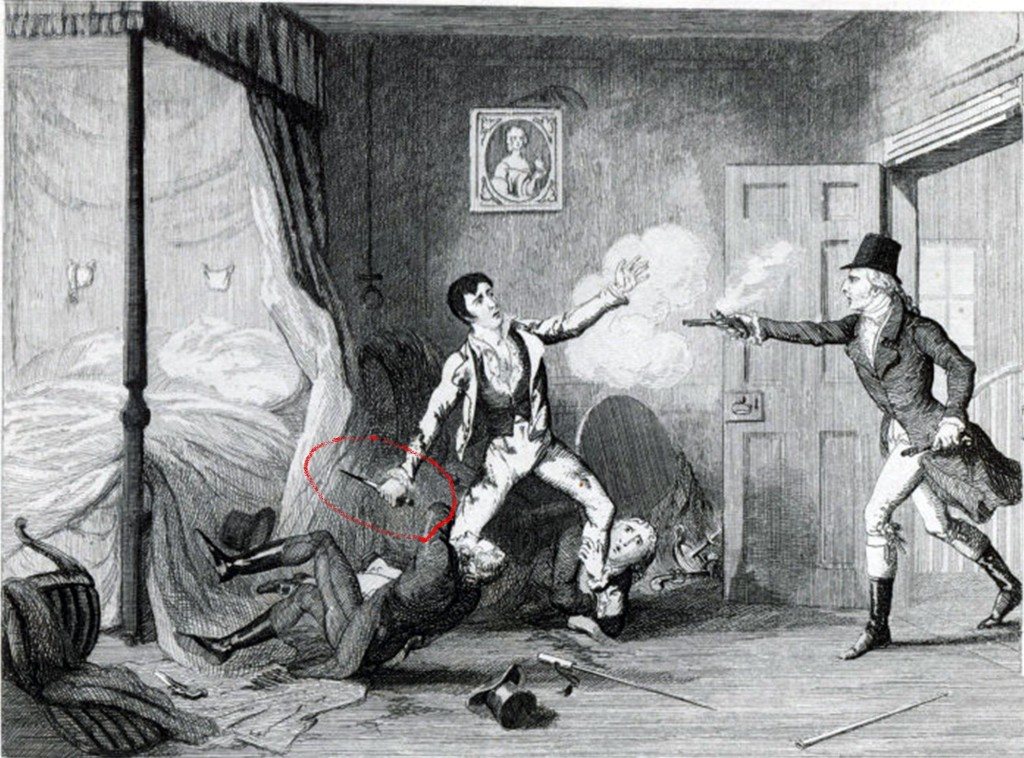Fitzgerald’s Dagger and a Child Thief December 6, 2013
Author: Beach Combing | in : Modern , trackbackLord Edward Fitzgerald was the great hero of the hopeless Irish revolt of 1798. When he was arrested on 4 May of that year he determined to sell his life dearly and set about his assailants with a knife causing many injuries. He died a month later of his wounds: wounds from the same fight. The knife he had used passed into the possession of Major Swan who kept it as a trophy until some point in the first decade of the nineteenth century it was lost. We say ‘lost’, in fact, it was, much to the irritation of Major Swan, stolen. What Swan did not realize is that the thief was not a parlour maid or a burglar but a child: namely Sheridan le Fanu’s mother Emma, then in her teens. The Le Fanus belonged to the Protestant Ascendancy. But as with many ‘West Brits’, they had divided loyalties, not least in their own hearts and Emma was described by her second son, William, as ‘more or less a rebel’. This is a little known account from Emma herself that she wrote in middle age, without any shame at what was, after all, an act of theft. It would be fascinating to know where the knife is today: perhaps still among the Le Fanus, who are all in England now? drbeachcombing AT yahoo DOT com Emma gave the knife to William with this account.
When I saw the dagger in the hands with which Lord Edward had striven in the last fatal struggle for life or death, I felt that it was not rightfully his who hold it, and wished it were in other hands. Wishes soon changed into plans, and I determined, if possible, to get it. I knew the spot in the front drawing-room where it was laid, and one evening, after tea, when Major Swan and his guests were engaged in conversation in the back drawing-room, I walked into the front drawing room, to the spot where it was. I seized it and thrust it into my bosom, inside my stays. I returned to the company, where I had to sit for an hour, and then drove home a distance of three miles. As soon as we left the house, I told my sister, who was beside me, what I had done. As soon as we got home, I rushed up to the room which my sister and I occupied, and, having secured the door, I opened one of the seams in the feather bed, took out the dagger, and plunged it among the feathers. For upwards of twelve years I lay every night upon the bed which contained my treasure. When I left home I took it with me and it has been my companion in all the vicissitudes of life.
Emma finished her account by stating that other families claim to have the dagger but hers is the true one. Thomas Moore, for example, claims in his biography of Fitzgerald that the dagger was in the hands of a Mr Brown until it was lost ‘by some accident’.
Emma Darwin writes, 27 Jun 2017: I came across your 2013 post about Lord Edward Fitzgerald’s dagger, where you wondered what had happened to it. You may since have found out, but just in case you haven’t, I thought you’d like to know that it’s now in the Limerick Museum: You’re right that it did descend through the LeFanu family when Emma – born Emma Lucretia Dobbin – married Thomas Philip LeFanu. They were all supporters of Home Rule, as so many of the Anglo-Irish gentry and professional classes were. The dagger came down the family, via Emma’s son William Richard (Joseph Sheridan’s younger brother), to my great-uncle, another William Richard LeFanu, and at his death in 1995 his daughters gave it to the Limerick museum. The anti- monarchist, anti-Establishment, left-wing streak was handed down too: my grandmother Lucie, nee LeFanu, used to tell the story of the dagger with great relish and fellow-feeling for her rebellious great-grandmother.



